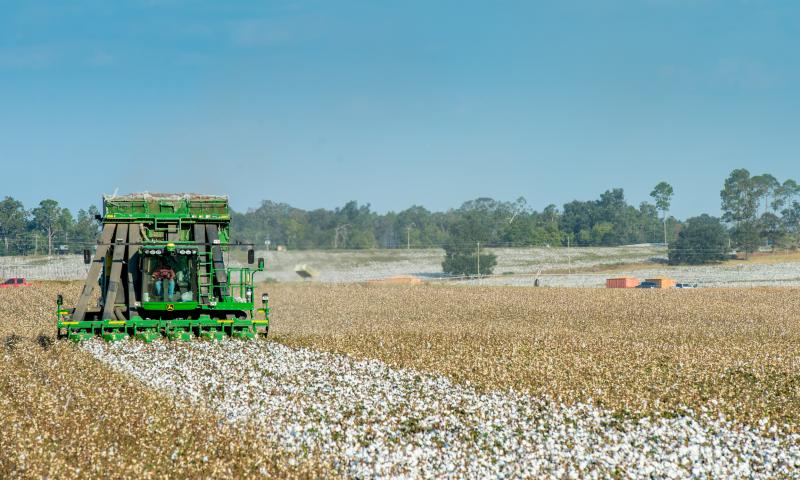Is it Good to Farm?

In 2013, Dodge Ran A Super Bowl Commercial For Its Ram Truck Featuring Paul Harvey’s Tribute To Farmers. Showing The Difficulty, Reality And Beauty Of A Farmer’s Work, This Ad Was Wildly Popular Because So Few Actually Get To Experience Farming. The Agriculture Industry, In Many Sectors, Is Going Through An Economic Reset.
A dedicated Farm Credit Association team member recently asked me the question “Is it good to farm?” She inquired in earnest on behalf of her clients, family and neighbors who are each concerned about industry challenges. I hope as we examine the elements of the answer to this question you will remember the positive most certainly outweighs anything else in agriculture, especially for farmers.
Immediately, my first response was yes. The agriculture industry is strong and opportunistic, particularly, farming. According to farm record summaries, the top 20 percent of managers consistently earn a 6 percent rate of return above long-term rate of inflation and above long-term rates of borrowed capital. Granted, these are above average managers that maintain good financials and management practices, and are prudent in investments, living withdrawals, and farm costs. These managers do not handle the largest operations but manage within the realm of their resources. Therefore, if profits are a priority in measuring long-term success, analysis finds opportunities abound.
Globally, the big picture for agriculture is bright. By the year 2050, estimates suggest an additional 60 to 70 percent more fiber, food and fuel will be consumed globally. However, for our next generation of producers, this increase will only require 70 percent of the current resource base. In that light, innovation and technology will be the keys for success. Build upon the principles of the past generation and focus on productive assets. The philosophies of “efficiency before growth” or “better is better before bigger is better” can lead to prosperity in agriculture.
In addition, farming encourages the entrepreneurial spirit. Farming rewards creativity and innovation in several areas including production and marketing. Additionally, every farm operation is structured differently offering flexibility in the alignment of the many, moving pieces. In farming, there is no formula or magic strategy that guarantees success. Instead, success can be created in numerous ways. In the future, growth may be in local, natural or organic products, or perhaps, in traditional farm operations, or maybe in larger, more complex, extended family corporations. Farming is a widely-varied profession and depending on your destination, there is a type of farming to get you to there.
Just days ago, I spoke to a Future Farmers of American (FFA) group in Franklin County, Virginia. During my presentation, a young participant asked if there was a bright future for young people in agriculture. As with the Farm Credit representative, my response was a quick and energetic, “Yes!” The agriculture industry directly or indirectly represents approximately one in six jobs in America. Young people who understand technology and exhibit good work habits such as, timeliness, ability to follow direction and social maturity will have boundless opportunity. Tanner and Sawyer, a senior and freshman in the group, had both attended our young farmer seminar sponsored by Farm Credit two weeks prior. At the end of the day, another speaker, Dr. Alex White, professor at Virginia Tech, and I were impressed with the pages of notes taken from our talk. What was even more impressive, however, was Tanner, the high school senior, assisting another classmate on his spreadsheet cash flow statement for a start-up beef operation. After seeing this, one cannot help but be enthusiastic about the future of the agriculture industry and the profession of farming.
Finally, life on a farm is special. I often hear in informal conversation with producers that raising a family on the farm is priceless. Growing up on a working farm affords children a unique perspective as less than 2 percent of our country’s population is directly involved in production agriculture. Additionally, farm life allows children to gain emotional intelligence. Whether or not they ever learn to drive a tractor, children growing up on a farm absorb a heightened sense responsibility, team-building, life-and-death as well as the seasonal nature of the industry. This type of intelligence is a life-building, rare skill. Benefits such as, farm life, do not always have a dollar amount assigned.
Regardless of the economic outlook, the cycle, or even where we are in the cycle, it is still good to be in agriculture and yes, to farm. The agriculture industry is integral to global economics, continuing innovation, and generations of sustainability. Farming requires strength of body, mind and heart. It is meaningful and fulfilling work that provides the food, feed, fiber and fuel upon which life is sustained. That is honorable and good.
About Dr. David Kohl
David Kohl received his M.S. and Ph.D. degrees in Agricultural Economics from Cornell University. For 25 years, Kohl was Professor of Agricultural Finance and Small Business Management and Entrepreneurship in the Department of Agricultural Applied Economics at Virginia Tech, Blacksburg, Virginia.